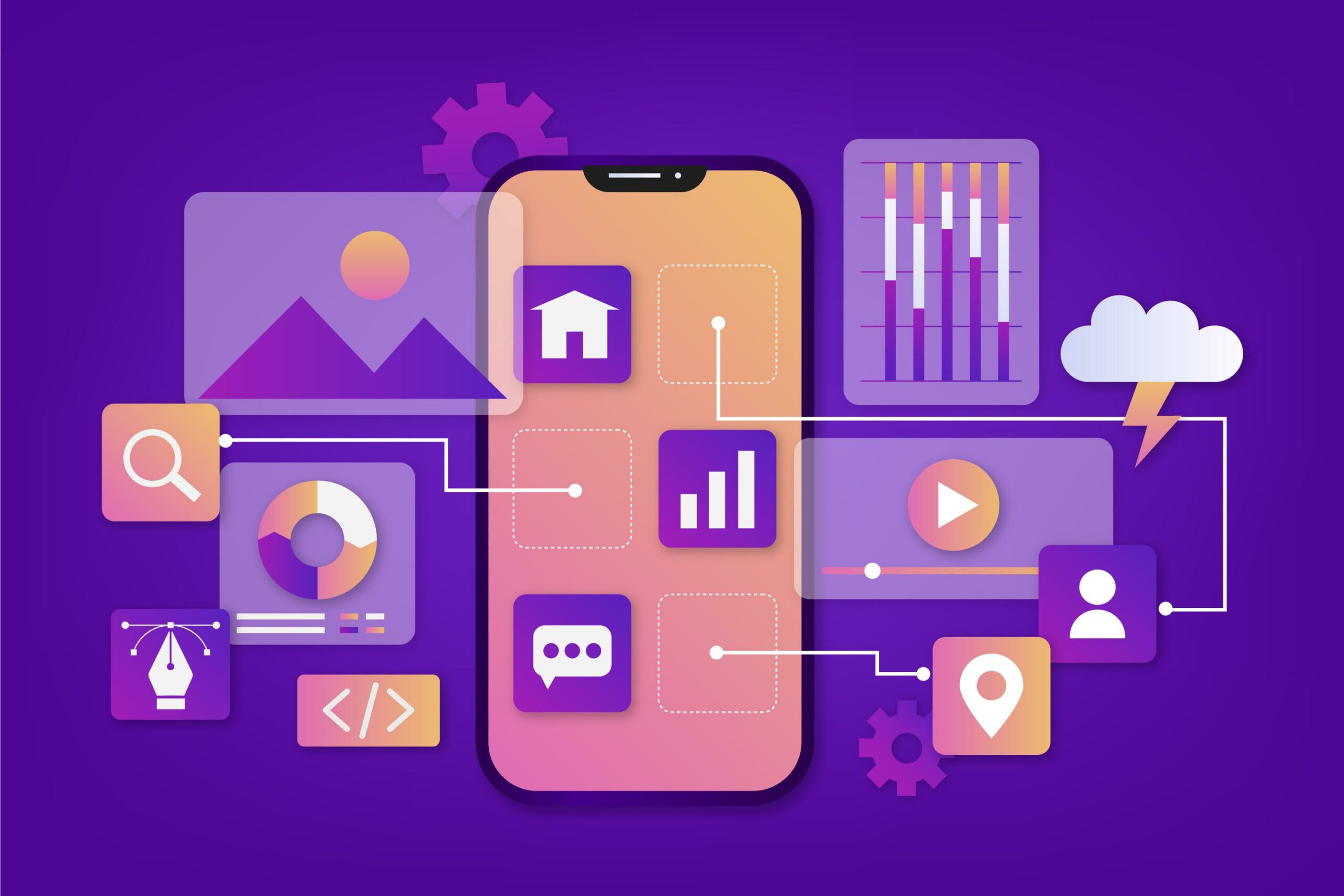As an entrepreneur, you understand the significance of possessing a competitive edge. The greatest way to obtain that advantage is to use the newest technologies to construct cutting-edge digital apps and sustainable processes. You can do this by creating your business mobile application.
Developing software applications for mobile devices is the essence of Enterprise Mobile App Development. Applications used in corporate settings might be native, third-party, or hybrid. These apps can increase efficiency and productivity throughout the company by giving users easy and rapid access to vital information or the capacity to make decisions. They are a critical instrument that helps companies operate at scale more effectively than before! We’ll learn about Enterprise Mobile App Development in this blog.

What is Enterprise Mobile App Development?
Developing mobile applications for big businesses is known as Enterprise Mobile App Development. The system’s primary users are the company’s employees, and the major objectives are to increase worker productivity and simplify corporate processes. Enhanced productivity is one of the main advantages of Enterprise Mobile App Development since it allows your staff to access critical information while on the go with the appropriate app. Artificial Intelligence (AI), machine learning (ML), and natural language processing (NLP) are used in modern workplace mobile apps to make them intelligent, tailored, and to assist businesses to increase productivity.
Creating scalable apps that assist businesses in streamlining their business processes is known as Enterprise app development. An Enterprise Mobile App Development, for instance, can help with:
Maintain system updates for firm data;
- Organize business units to pursue shared objectives;
- lower the costs associated with departmental handoffs;
- assist management in making data-driven decisions;
- Establish a central location for managing business procedures.
Top 4 Trends Of Enterprise Mobile App Development
Technologies are a disruptive force in the creation of Enterprise Mobile App Development. As with all areas of progress, however, adopting AI and big data could have been smoother. Thus, the following are the top 4 technologies that have recently affected the creation of Enterprise Mobile App Development.
Microservices
Microservices is an application architectural style composed of distinct services. These services can have their admin panels, be developed using other technologies, and be deployed independently. With so many tools available, manufacturing can be accelerated dramatically while system security and dependability are also raised.
Cloud-based Services
Although cloud-based corporate apps have been gradually taking over the business world by lowering upfront costs and making such programs accessible for small and medium enterprises, a large portion of Enterprise Mobile App Development has historically been hosted on company servers.
Large Data Set Included
Big data refers to the vast amounts of information that companies handle daily. Enterprise Mobile App Development is critical, as seen by the rapid growth of big data.
Companies can now gather data from a wide range of sources. When the information builds up, it might be difficult to link, match, and analyze, which poses a serious bottleneck for organizations. Enterprise big data apps can help systematize large data sets and accelerate business processes.
Artificial Intelligence
AI and machine learning advanced the creation of Enterprise Mobile App Development, just like they did for consumer apps. Large businesses are uniquely positioned to take advantage of the most recent advancements in AI and machine learning to give business insights, enhance customer experience, and remain ahead of the competition due to the growth in corporate data.
Why Does Your Business Need a Modern Enterprise Mobile App Development?
To succeed in Industry 4.0, modern Enterprise Mobile App Development must enable real-time decision-making and improve productivity, flexibility, and agility. Modern corporate mobile applications serve as a doorway to digital transformation by utilizing cutting-edge technologies like artificial intelligence (AI), the Internet of Things (IoT), machine learning (ML), and others to help businesses become more productive, efficient, and responsive while also improving customer experience and gaining a competitive edge.
Employees may make prompt, well-informed decisions with real-time access to vital company information through Enterprise Mobile App Development.
By utilizing contemporary Enterprise Mobile App Development, businesses may enhance processes, provide better customer service, and eventually meet their goals.
The primary goal of Enterprise Mobile App Development is to streamline corporate procedures. However, the reasons may vary depending on the particular situation.
Continue to be Effective
As your firm expands, keeping track of every aspect of your everyday operations becomes more challenging. Regrettably, this may result in deliveries, late payments, and unforeseen losses. An enterprise app will assist you in identifying inefficiencies impeding your company’s growth.
Increase Revenue to the Maximum
You’ll find it easier to increase income the more efficiently your internal processes run. This allows you to serve a greater number of clients with the service.
Cut Down on Losses
Enterprise Mobile App Development can assist in cutting down on wasteful spending and identify areas where efforts are ineffective by monitoring every process inside your company.
Control the Payment Transaction Process
Overseeing every money transaction on your website is challenging. If your company expands daily, enterprise apps can assist with deadline tracking, alerting systems, transaction management, and more. You can incorporate a range of payment options, taking into account your organization’s objectives and needs.
Streamline corporate procedures
Using an enterprise application can avoid large quantities of paperwork and hassle. You may automate data processing, transaction control, and marketing campaigns while maintaining composure and achieving your company’s objectives.
3 Types Of Enterprise Mobile App Development
Worker Position
The most fundamental company mobile apps are those used internally by staff members to manage workflow and communications. These applications are frequently feature-based, but they let managers monitor the progress of their projects. These apps facilitate a more efficient workflow and give real-time updates.
Slack is a well-known example of a business tool for communications at the employee level. With over 10 million daily active users, Slack offers communication speeds far faster than email and more integrations than any other platform. Furthermore, with more than 40% of Fortune 100 companies utilizing it, Slack has established itself as the preferred platform for increasing productivity.
Departmental Level
The departmental process is aided by the following category of enterprise apps: Apps at the department level, for instance, help staff members who handle related duties, like sales or marketing. Executives may oversee entire departments and monitor productivity with the help of these apps.
CRMs are an excellent illustration of this type of enterprise application for sales management. Most CRMs routinely record emails, calls, meetings, and other sales activities, which gives an overview of the work done by the entire department.
Business Class
The last category of enterprise apps is connecting all corporate departments, including managers, executives, and employees, into a single network. In this instance, enterprise-level apps typically aim to streamline task distribution and automation. Providing everyone with the required paperwork does this.
An application for inventory management could be one example. These apps can monitor entering and exiting merchandise and track items across locations. This aids in maintaining appropriate supply levels. Additionally, this type of software can notify users when stock levels decline and demand increases.
Enterprise Apps Must-Have Features
A comprehensive feature list does not exist for enterprise applications. Rather, the feature set is unique to each corporate app and is determined solely by the operational requirements of that specific firm. However, I’ve compiled a list of the most typical features to make it more transparent. Thus, when developing a business app, consider including the following features:
Large Databases
Enterprise apps are corporate systems that handle user data and data flows closely. Enterprise databases are specialized storage units that house all of this data.
Databases contain complete and accurate information about individuals, products, and assets.
Database tables need to be secure and scalable since data is always changing. Databases should also function smoothly and without lag across all platforms and devices.
Different User Roles
Enterprise Mobile App Development are designed to benefit all company users. However, only some participants should have access to the information on the app. User roles accomplish this. They grant specified groups of users authorization to carry out specific actions and use particular data in the corporate app.
For instance, the user position of a “deliverer” is filled by your partner delivery firm. This individual can access the customer’s information, delivery address, order details, and more. This individual will only have access to insider data regarding payments or financial statistics. The problem is that they will need access to such information in their current function as a user.
Third-Party Application Interfaces
Withmpossible to develop a business app with other apps. You have Jira if you require a task management program, Toggl if you want a project planning and tracking tool, and Google Docs if you want real-time editing. And these are but a handful of the successful integrations you can achieve. So, use common sense and collaborate with the developers of the existing apps to get the most out of them rather than starting from scratch.
Analytics in Real Time
An enterprise app serves as a forum for communication among hundreds of users. This is particularly valid in the context of remote teamwork. You must have real-time update capability for your enterprise application to prevent any data processing lags.
Instant Communication
One of the main objectives of a business app is to give your employees a place to communicate with one another. Therefore, adding chat support to your enterprise app would be a great idea as it facilitates easy communication between staff members and aids in documenting past modifications to certain files.
Benefits of Enterprise Mobile App Development
Enterprise Mobile App Development integration into corporate processes is primarily motivated by increasing productivity, earnings, and cooperation through automation. Numerous crucial advantages are available in the mobile app market, including excellent security, smooth portability, and compatibility with other apps and devices. Let’s examine each benefit in more detail.
Automating Repeated Manual Tasks
Data entry and report generation are two time-consuming and tiresome procedures that Enterprise Mobile App Development can automate. This can increase output and decrease mistakes, giving you more time to concentrate on long-term objectives and strategic work.
Better Supply Chain Management
Real-time information regarding inventory levels, order status, and delivery dates can help businesses optimize their supply chain processes. This degree of visibility lowers mistakes and delays while enhancing your order fulfillment procedure.
Streamlined Onboarding Process for Employees
Human resource business apps streamline the onboarding process for new hires by automating many of the procedures required. Enterprise Mobile App Development apps save the HR department time and money by offering self-service alternatives, quick access to vital organization data, and training materials. They also enhance the onboarding process for new hires.
Simplified Data Administration
Enterprise Mobile App Development can automate tasks and manual data entry, lowering human error rates, boosting productivity, and simplifying data administration. They offer employees real-time access to data as a centralized platform for gathering, storing, and evaluating data. They make data sharing even easier, boosting output and speeding up problem-solving. Organizations can, therefore, make defensible decisions based on up-to-date information if they have access to accurate and timely data.
Reduced Documentation
Apps help reduce paperwork by automating processes and offering digital forms and papers that can be completed and electronically signed. In addition to increasing productivity, they help businesses reduce manual errors and paper waste.
Enhanced Client Experience
Companies in all sectors can improve customer satisfaction by offering quick access to product details, simple ordering, and timely assistance. This can enhance loyalty and foster closer ties with customers.
Smooth Communication
Enterprise Mobile App Development can enhance departmental, customer, and employee communication. As a result, businesses may communicate more successfully, handle problems faster, and offer better services.
Increased Reactivity
Enterprise Mobile App Development can enhance responsiveness by providing real-time alerts and notifications, empowering staff members to react promptly to client questions or concerns. With this assistance, businesses can decrease downtime and increase customer satisfaction.
Considering these indisputable benefits, let’s explore the many kinds of mobile apps and how they can transform various facets of your business.
Types of Mobile Enterprise Applications
Choosing the proper Enterprise Mobile App Development in the modern digital era can greatly impact the success and effectiveness of your company’s operations. There are many options available in the flexible world of mobile apps, all of which are made to meet specific company requirements. There is a mobile app type that is ideal for your particular goals, whether you want to increase productivity, optimize internal
communication, boost consumer engagement, or streamline sales processes. Among the most popular categories of business mobile applications are:
Client-facing apps
These apps improve the customer experience by making customer information, order placement, and support services easily accessible. Examples include apps for ordering and delivering meals, retail, and mobile banking.
Field Service Apps
These applications are intended to increase the productivity of field service personnel by providing real-time access to client data, schedules, and service history. Two examples are apps for scheduling maintenance and inspection.
Marketing Automation Apps
Use them to simplify marketing chores like customer segmentation, campaign management, and lead creation. Email marketing apps and social media management apps are two examples.
Enterprise Resource Planning (ERP) Applications
Simplify corporate procedures in supply chain management, finance, procurement, and human resources. Apps for inventory control and accounting are two examples.
Applications for Customer Relations Management (CRM)
These programs facilitate better consumer interaction and relationship management. Two examples are apps for sales force automation and customer support portals.
Apps for Supply Chain Management (SCM)
These programs let you handle every supply chain step, from procurement to delivery. Two examples are apps for warehouse and logistics management.
Apps for Collaboration
These collaboration tools enhance communication and cooperation among staff members, departments, and partners. Some examples include team collaboration tools like Slack, Jira, Asana, Monday.com, etc.
Apps for Financial Management
Use these tools to effectively manage financial tasks like payroll, budgeting, and accounting. Two examples are apps for tax preparation and cost management.
Advice For Enterprise Mobile App Development
An Enterprise Mobile App Development comprises several fundamental elements, auxiliary features, integrations, and procedures, making it highly specialized software. It is unnecessary to emphasize how difficult it could be to coordinate all those procedures.
Align Every Process Flow
An enterprise app is software that you develop specifically for your business. It must have some, if not all, of its features specially tailored to your company’s requirements.
For example, developers typically integrate an already-built admin panel rather than creating one from scratch for standard apps. This is generally a reasonable answer because it saves time and eliminates needless work.
For a business app, though, there might be a different technique. Enterprise apps must synchronize numerous business operations simultaneously, making them challenging. As unexpected as it may seem, if your company makes the claim, you may need to build your specialized admin platform.
Security Concerns
Enterprise applications are tightly integrated with databases like any other business system. Regrettably, there have been numerous instances where hackers have compromised these systems and misused personal data. Such incidents may result in tampering with users’ private information and ultimately harm your business’s reputation. Because of this, developing enterprise apps is built on strict security requirements.
You can utilize the following defense techniques to give your enterprise app security:
- controls for authentication: multi-factor authentication, or (2FA);
- permission-based entry
- secure keeping of keys.
Competing With Easier Fixes
No matter how complex your software is, there’s always a chance that a particular issue has an existing fix. Many analytical tools, such as Google Sheets and Excel, facilitate business tasks. More than implementing functionality alone may be required. To remain competitive in the market, your corporate software needs to provide something different, carve out a new niche, or have a competitive advantage.
Reacting to Modifications
Generally speaking, an enterprise is a highly dynamic, changing system. Like any self-maintained system, it’s only sometimes possible to foresee every little aspect. Thus, unpleasant surprises do occasionally occur.
How Much It Costs To Develop An Enterprise App
The cost of developing an enterprise app is very variable and is mostly dependent on the app’s functionality, project requirements, and desired design.
You can use this straightforward formula to get an idea of the cost of developing a business app:
Development Time x Cost / Hour = Total App Development Cost for Enterprise Mobile Apps
Even though this will only provide a crude estimate, it is a useful tool for cost discussions, budget decisions, and selecting a development partner.
Leading Trends in Enterprise Mobile App Development
Although there are many new trends in the ever-evolving field of enterprise app development, the following are some significant trends in Enterprise Mobile App Development that we selected following in-depth, fact-based research:
Machine learning and artificial intelligence (AI/ML)
AI and ML technologies enhance user experiences across several corporate disciplines, including marketing, operations, finance, and human resources. They make it possible to use chatbots for better customer service, personalized content, and task automation to increase operational efficiency.
Blockchain Methods
Enterprise Mobile App Development benefits from blockchain’s data security and transparency support, especially in industries like banking and healthcare. Blockchain improves trust and safety by ensuring the security of data sharing and transactions in mobile apps.
Acknowledging the Metaverse
The Metaverse concept is gaining traction in Enterprise Mobile App Development to provide customers and employees with more immersive experiences. Users can easily access several services in one location and move between experiences. Watch on market giants Meta and Microsoft, who might release some fascinating new products in 2024.
Virtual reality (VR) and augmented reality (AR)
AR and VR technologies make Enterprise Mobile App Development immersive and engaging. These applications are perfect for visualization, remote collaboration, and training, ultimately increasing user productivity and engagement.
Development using No-Code and Low-Code
Platforms with low-code and no-code make it easier for non-technical users to construct mobile apps. Because of this trend, new ideas can be introduced to the market more quickly and with less development time.
Issues in Creating Enterprise Mobile Applications and How to Solve Them
Variety of Platforms
Creating apps for several Enterprise Mobile App Development platforms (including Windows, iOS, and Android) guarantees that a larger group of people inside the company will use the app. In addition to offering businesses greater flexibility in their mobile strategy, platform diversity allows them to expand into international markets and reach a wider audience.
Resolution
You can use cross-platform development technologies like Flutter or React Native to expedite and streamline cross-platform development.
Security Issues
Sensitive company data and private customer information must be protected, as mobile apps are vulnerable to many security risks.
Resolution
To protect sensitive data, use secure APIs, implement strong encryption, and conduct frequent security assessments.
Combining Legacy Systems with Integration
Many businesses still use outdated technology, so integrating new mobile apps with them might not be easy.
Resolution
Provide middleware or APIs to connect modern mobile applications with outdated systems.
Enhancement of Performance
Mobile apps must function flawlessly, load rapidly, and use as few device resources as possible to give users a satisfying experience.
Resolution
To enhance your app’s performance, keep improving the code and assets. When feasible, make use of asynchronous processes and caching.
Quality Control and Testing
Thorough testing on various devices, OSs, and network circumstances takes time but is necessary to ensure a bug-free program.
Resolution
Use automated testing tools and services to expedite testing on various devices and network situations. Establish a thorough QA procedure.
Financial and Material Restraints
For businesses, finding a balance between app development’s features and expenses and available resources can be a continuous struggle.
Resolution
Set features in order of importance and distribute resources wisely. Consider developing in phases to control costs.
Synchronization of Data
Managing data synchronization between the mobile app and backend services can be particularly challenging in offline or sporadically connected settings.
Resolution
To guarantee consistent data access, use data synchronization strategies, including offline storage and real-time data sync.
Conclusion
The process of developing an enterprise app is intricate and involves numerous factors that must be carefully considered. Managing unforeseen events, integrating third applications, and ensuring security are just a few of the fundamental elements supporting enterprise app creation. These qualities, though, represent investments in your company’s competitiveness.
At Uptech, we strongly emphasize identifying users’ actual needs and designing products with them in mind. Contact us to learn more about the features your enterprise app should have.
Frequently Asked Questions (FAQ)
What distinguishes mobile apps for enterprises from those for startups?
A: Enterprise Mobile App Development are made for well-established companies, emphasizing regulatory compliance, scalability, and intricate workflows. They serve a restricted user base and have bigger expenses. On the other hand, apps for startups, which frequently have limited resources and emphasize gaining a foothold in the market, prioritize quick growth, innovation, and user acquisition.
How can your business mobile app be secured?
A: You may begin securing your workplace mobile app by implementing strong authentication and authorization procedures and extensive data encryption. Update the app and its backend frequently, carry out security audits, and inform users of recommended procedures. Adhere to data privacy laws and establish an incident response strategy. Proactive security requires the ability to wipe, log, and monitor remotely.




